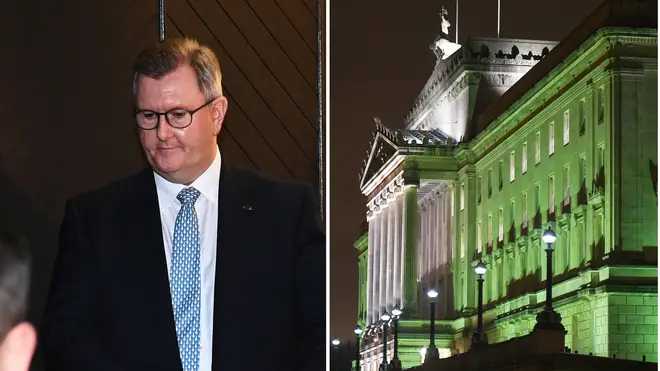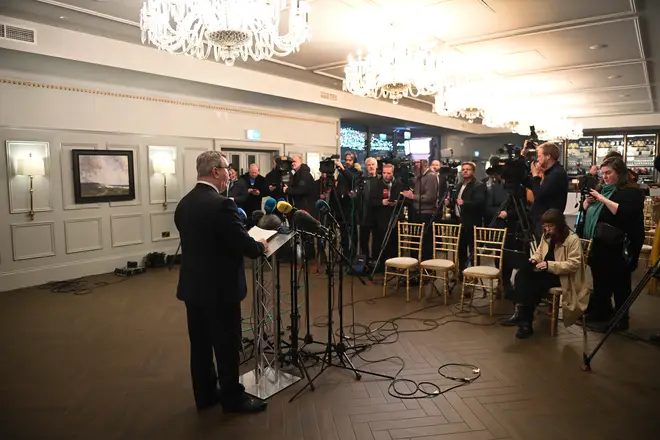
Paul Brand 10am - 12pm
30 January 2024, 01:36 | Updated: 30 January 2024, 05:38

Powersharing is set to return in Northern Ireland is set to return after DUP leaders backed a government deal that aims to tackle its concerns over post-Brexit trade barriers.
DUP leader Sir Jeffrey Donaldson said the legislation agreed with Westminster would "remove checks on goods moving within the UK and remaining in NI, and end Northern Ireland blindly following EU laws", if the law is passed as agreed.
He added: "There will be legislation protecting the Acts of Union, which guarantees unfettered access for Northern Ireland business to the rest of the UK."
It has taken 726 days for the DUP leader to steer his party back on the path to power sharing after the DUP withdrew from Stormont in early 2022.
While it is still unclear what the Northern Ireland government will look like, Sir Jeffrey gave assurances that these measures will be taken as "legislative commitments".
The specific details of the deal are yet to be published but the DUP leader said that the vote during the party's executive meeting had been decisive and that he was "confident" in the progress that had been achieved this morning.
Sir Jeffrey said that believed the government could move “quickly” to implement what had been agreed with the DUP.
However, Traditional Unionist Voice (TUV) leader Jim Allister took to X, formerly known as Twitter, vent his outrage to the outcome of the executive meeting, branding the agreement as a 'betrayal'.
He wrote: "Sadly, in betrayal of their own solemn pledges, the DUP has caved in on an Irish Sea border, EU law and the suspension of Article 6. Seems not one word of the Union-dismantling Protocol has been removed."
The agreement was also supported by the party leaders, who welcomed the decision and looked ahead at moving on to form the new power-sharing executive.
SDLP leader Colum Eastwood said"let's get the workers paid and the waiting lists down now then," in a post on X.
Former Northern Ireland Secretary Julian Smith, also posting on X, said that today marked "a day of hope".
Labour's Shadow Secretary of State Hilary Benn says this is "good news for NI"
He added: "The task now will be for all of us to support the new power-sharing executive."

At the press conference, Sir Jeffrey Donaldson emerged to face reporters who had been waiting for the decision through the night until the early hours of the morning, and began by apologising for the late wait.
The DUP leader said that the party had worked hard to get a deal which would be supported by both unionists and nationalists.
He continued:"Prior to our decision we warned that a failure to deal with the protocol - its disruptive impact was putting us in an unsustainable position.
"Having taken a strong and principled stance - we were able to bring the UK government and the EU commission to negotiations."
He added: "We have worked with the UK government in the recent months - so that Northern Ireland has the best chance for long-term prosperity.
"Where it can make a long and meaningful life for the people of Northern Ireland."
Sinn Féin's leader Mary Lou McDonald said that she felt "optimistic" about getting institutions back up and running following the DUP's endorsement of the new deal.
She added: "Sinn Féin will now engage with the parties and both governments to ensure we now all press on without delay.
"It is vital there is political stability to address the scale of the crisis across our public services."
Ms McDonald said that it was now time to "focus minds on the job at hand and to the solutions required to support workers and families who want and deserve functioning government".

The DUP's boycott of a power-sharing government was in protest against at the Windsor Framework, which is a post-Brexit trade checks between Northern Ireland and Great Britain.
After the UK left the EU, a deal was required to allow trade to continue smoothly across the Irish border after massive disruption caused by the country leaving the European trading bloc.
A major issue which was at the heart of the row was the possibility of checks being introduced at the border shared between Northern Ireland and the Republic of Ireland.
Due to the turbulent history between the two nations, any potential deal or talks have been treated with the utmost sensitivity.
The UK and the EU agreed on the Northern Ireland Protocol, which introduced checks at Northern Ireland's ports for goods coming from Great Britain.
This was met with widespread opposition among unionists who saw the move as a diminishing of Northern Ireland's place within the UK's internal market.
The Windsor Framework was later introduced to assuage those concerns, and was agreed in February 2023 between the government and the European Union.
However, the DUP felt the the Windsor Framework did not go far enough.